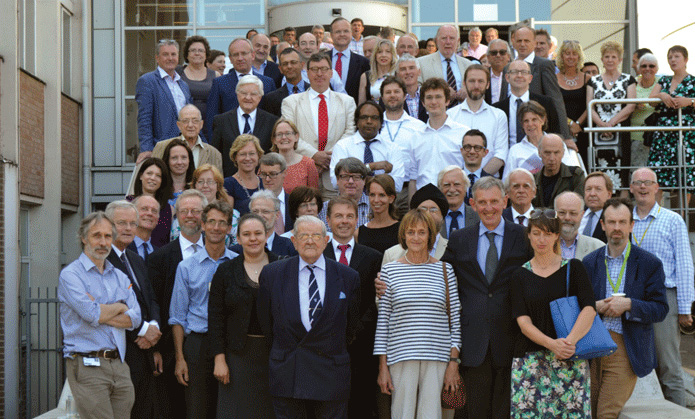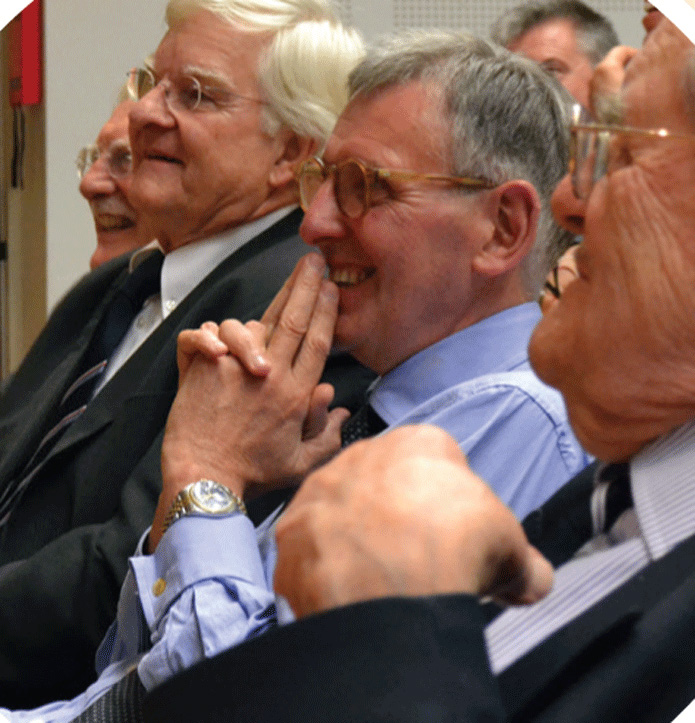
In a hot lecture theatre in the old LMB in Cambridge in July, the career and achievements of Alastair Compston were celebrated in a 16 lecture 9 hour bonanza – of which two were video recorded from San Francisco (Steve Hauser) and Australia (Simon Broadley). The day involved a series of short talks introduced by two chairs who delivered some personal, and often revealing, recollections on Alastair, with the whole meeting suffused with good humour and personal warmth and admiration but not without some gentle mocking.
So what did we discover outside of what we already knew about Alastair’s contribution to the genetics of MS and the taking of Campath-1H to the clinic?;
- That many of the current Professors of Neurology in the UK had spent formative times undertaking research with Alastair and this included Messers Sawcer, Wood, Chandran, Scolding, Robertson, Zajicek with many others in the audience such as Chris Shaw. Several of this distinguished team spoke about how he had shaped their future research careers such as Nick Wood and his huge contribution to the genetics of Parkinson’s disease. In addition, looking across at the audience of several hundred revealed that a significant proportion of the current neurological community in the UK have been in receipt of a major input from DASC.
- That Alastair had not only been involved with MS in the way described, but also had made significant contributions in other auto-immune diseases, most notably Myasthenia Gravis. This was all beautifully summarised in a talk by Angela Vincent where she went on to discuss the plethora of new auto-immune diseases that are now well recognised.
- While Alastair has been involved in the antibody therapy of MS, it has not been restricted to this domain with Siddharthan Chandran and Neil Scolding discussing in vitro modelling of axon-glial interactions and the development of stem cell based treatments for demyelinating disease.
- Many who know Alastair will also know of his passion for books – especially ones that are very old and written in languages that are archaic at best. It was therefore a delight to hear from someone who has a similar disorder (described as medicobibliomania), Jan van Gijn about how this comes about and how it can be cured. His three solutions were firstly, to turn away, abstain and simply retreat to being a wise thinker through the Socratic method; buy the ultimate of all old medical books (De humani corporis fabrica by Vesalius, a cool £265,250); or thirdly actually try reading them all!! Jürg Kesselring and Klaus Toyka celebrated Alastair’s European presence, including early morning haggling in bookshops on the Rue Jacob in Paris.
- The contribution that Alastair himself has made to the neurological literature was also covered with many references to his editing roles in McAlpine’s textbook on MS – that inspired much of what Hans Lassmann has done and spoke about. In addition his 10 year editorship of Brain was put into historical context by the current Editor, Dimitri Kullmann who explained how the journal originated out of cases seen at the National. Simon Shorvon then followed up with a history on how neurology was practised in the first half of the 20th century, which would leave a lot to be desired by the current EU directive on working conditions.
- The initiatives that have taken place in Cambridge under Alastair were also touched upon perhaps most clearly by James Fawcett discussing the origins, trials and tribulations of the Cambridge Centre for Brain Repair, and Trevor Robbins on the development of a specifically designed overarching Cambridge Neuroscience structure. These all highlighted Alastair’s capacity to think big and have visionary concepts on how to develop and make fields of neurobiology and neurology flourish and with this has come many successful careers.
- Finally we were treated to the development of Campath-1H for MS and the brave decisions that needed to be made en route for it to become a licensed drug for MS. This initially involved the academic development of this agent in human trials in MS, building on the seminal work of Herman Waldmann, who spoke about this and his current work on regulatory T cells. There then followed a talk by Mark Enyedy on the commercial development of the drug and the bravery, tenacity and guile needed to persuade big Pharma to take this on as a money earner. This having been achieved, the final talk by Joanne Jones discussed some of the new interesting questions that the use of this agent has thrown up around the development of autoimmune diseases. This talk also encapsulated all that Alastair has done in many ways, bringing on young scientists in an environment that encourages and recognises the importance of such work.

The day then concluded with a very special dinner at Jesus College, where Alastair is a fellow, with talks by John Walton (born 1922) and Alasdair Coles (born much later) – the latter pointing out many of Alastair’s outstanding qualities, not least his editing skills which on one occasion extended into correcting quotes within the text, some of which were from scripture. Now that is some legacy!

